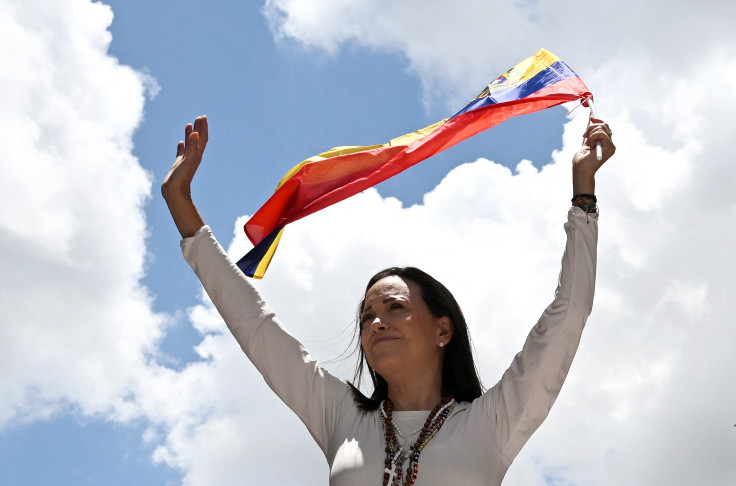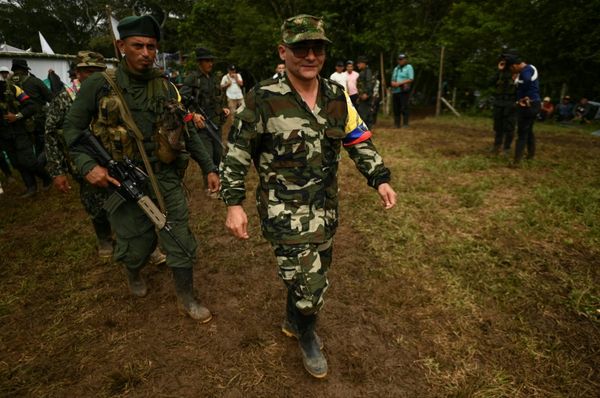
On Friday, Venezuelan opposition leader María Corina Machado became the sixth person of Latin American descent to receive the Nobel Peace Prize for her ongoing fight to achieve a democratic transition in Venezuela. According to the Norwegian Nobel Committee, Machado is a woman "who keeps the flame of democracy burning amid a growing darkness."
As reported by The Washington Post, Machado was stunned when a representative from the committee contacted her with the news. "Oh my God ... I have no words," she said in a video of the call posted on X by the committee.
“Oh my god… I have no words.”
— The Nobel Prize (@NobelPrize) October 10, 2025
Listen to the emotional moment this year’s laureate Maria Corina Machado finds out she has been awarded the Nobel Peace Prize.
Kristian Berg Harpviken, Director of the Norwegian Nobel Institute, shared the news with her directly before it was… pic.twitter.com/OCUpNz752k
Throughout history, Latin Americans have been recognized in four of the six Nobel categories: literature, peace, physiology or medicine, and chemistry. Generally speaking, the first Latin American to receive the Nobel Prize was Argentine diplomat Carlos Saavedra Lamas, who was awarded the Peace Prize in 1936. Since then, six more Latin Americans have been honored with the award, making Machado only the second woman from the region to receive it.
For more than a century, the Nobel Peace Prize has been presented to individuals who meet specific criteria and have made outstanding contributions to the promotion of peace around the world.
Lamas, the first Latin American laureate, served as Argentina's foreign minister and president of the Assembly of the League of Nations. He was the first Peace Prize recipient from outside Western Europe or the United States, recognized for his role in mediating and helping end the Chaco War between Paraguay and Bolivia in the 1930s.
It would be 44 years before another Latin American received the honor. In 1980, Argentine human rights activist Adolfo Pérez Esquivel was recognized by the Nobel Committee for "being a source of inspiration to repressed people, especially in Latin America."
After Argentina's 1976 military coup that overthrew President Isabel Perón, the country fell under a brutal dictatorship marked by widespread violence and repression. During that period, Esquivel became known for his nonviolent activism. He traveled extensively throughout Latin America promoting human rights until 1977, when he was arrested, tortured, and held without trial for 14 months by the military regime.
In 1982, the Peace Prize was awarded to Alfonso García Robles, a Mexican diplomat and politician. He was honored for his efforts toward disarmament and the establishment of nuclear-weapon-free zones in Latin America and the Caribbean.
Following the 1962 Cuban missile crisis, García Robles played a central role in efforts to make Latin America a nuclear-free region. His work led to the 1967 Treaty of Tlatelolco, signed by 14 countries in Mexico City. The treaty established Latin America and the Caribbean as a nuclear-weapon-free zone and prohibited the acquisition, production, testing, or deployment of nuclear weapons in the region.
In 1987, the Peace Prize again went to a Latin American figure. Costa Rican President Óscar Arias Sánchez was recognized for his regional peace plan aimed at ending civil wars in Guatemala, El Salvador, Honduras, and Nicaragua.
Despite the long-standing recognition of Latin Americans, it was not until 1992 that a woman from the region received the Peace Prize. That year, Guatemalan activist Rigoberta Menchú was honored for her work as a leading advocate for the rights of Indigenous peoples.
From a young age, Menchú became a prominent figure in the women's rights and social justice movements. Her activism drew fierce opposition, and members of her family, including her father, mother, and brother, were killed by armed forces during Guatemala's civil conflict.
She has returned to Guatemala at least three times to continue her work, but ongoing death threats have forced her into exile on multiple occasions.
Before Machado's win, the most recent Latin American Peace Prize laureate was former Colombian President Juan Manuel Santos, who received the award in 2016 for his efforts to end the country's decades-long conflict with guerrilla groups.
Shortly after her award was announced, Machado said the prize was a recognition of the struggle Venezuelans have endured in their efforts to bring down President Nicolás Maduro's regime.
"We are on the threshold of victory, and today more than ever we count on President Trump, the people of the United States, the peoples of Latin America, and the democratic nations of the world as our main allies to achieve freedom and democracy. Venezuela will be free," Machado wrote on X.
This recognition of the struggle of all Venezuelans is a boost to conclude our task: to conquer Freedom.
— María Corina Machado (@MariaCorinaYA) October 10, 2025
We are on the threshold of victory and today, more than ever, we count on President Trump, the people of the United States, the peoples of Latin America, and the democratic…
© 2025 Latin Times. All rights reserved. Do not reproduce without permission.









